Share

UCL Sarah Parker Remond Centre Podcast
What Does Eugenics Mean To Us? Episode 6: People, people, people
One of the ways in which eugenics became incorporated into mainstream society all around the world was through the birth control movement. Early twentieth-century birth control pioneers like Marie Stopes and Margaret Sanger were also ardent eugenicists, and their motives were bound up with imperial concerns about, as eugenicists saw it, the deterioration of the 'white race'. Their arguments were taken up in the cause of another imperialist concern, which was the growing population of non-white people in the colonies. In this episode, Subhadra and her guests consider how we can confront historical and contemporary eugenics practices in the continuing struggle for reproductive justice.
Transcript: www.ucl.ac.uk/racism-racialisation/transcript-what-does-eugenics-mean-us-episode-6
This conversation was recorded on 22nd April 2021
Host: Subhadra Das, Critical Eugenics Researcher, UCL Sarah Parker Remond Centre
Guests: Kate Law is a feminist historian who specialises in twentieth-century Southern African history. She is currently a Nottingham Research Fellow in the School of History at the University of Nottingham, and a Research Fellow in the International Studies Group at the University of the Free State. Her first book, Gendering the Settler State: White Women, Race, Liberalism and Empire in Rhodesia, 1950-1980 was published by Routledge in 2016, and her current research project is Fighting Fertility: The British Anti-Apartheid Movement and the Politics of Race and Contraception in South Africa.
Kalpana Wilson is a Lecturer in Geography and her research explores questions of race/gender, labour, neoliberalism, and reproductive rights and justice, with a particular focus on South Asia and its diasporas. She is the author of Race, Racism and Development: Interrogating History, Discourse and Practice (Zed Books, 2012) and has published widely on race, gender, international development, women’s agency and rural labour movements.
Paige Patchin is a Lecturer in Race, Ethnicity and Postcolonial Studies, and one of the founding lecturers at the Sarah Parker Remond Centre. Paige is a feminist geographer whose work looks at structures of power in biological, health, and earth sciences. Her research interests include infectious disease, race, and empire, genetics and epigenetics, reproductive health, and the Anthropocene. Her current book project looks at the Zika public health emergency between Puerto Rico and the United States.
Producer: Cerys Bradley
Music: Blue Dot Sessions
www.ucl.ac.uk/racism-racialisation/what-does-eugenics-mean-us
More episodes
View all episodes
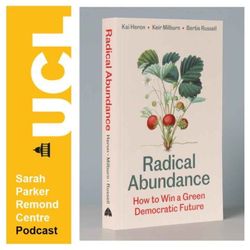
3. SPRC In Conversation with Keir Milburn and Kai Heron: Part 3
20:23||Ep. 3Radical Abundance – understanding the reconfiguration of the global economy and how we might survive itKeir Milburn and Kai Heron in conversation with Gargi Bhattacharyya. This conversation was recorded in the summer of 2025 and discusses the changing role and approach of the United States and the extreme hardships arising from climate catastrophe as triggers to re-imagine the global economy.The conversation was recorded before the publication of Kai and Keir’s excellent and celebrated book, ‘Radical Abundance’, but the themes of the conversation echo the preoccupations of the book.There was a lot to discuss here – as a result we have split the conversation into three sections for ease of listening.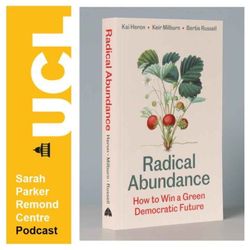
2. SPRC In Conversation with Keir Milburn and Kai Heron: Part 2
20:41||Ep. 2Radical Abundance – understanding the reconfiguration of the global economy and how we might survive itKeir Milburn and Kai Heron in conversation with Gargi Bhattacharyya. This conversation was recorded in the summer of 2025 and discusses the changing role and approach of the United States and the extreme hardships arising from climate catastrophe as triggers to re-imagine the global economy.The conversation was recorded before the publication of Kai and Keir’s excellent and celebrated book, ‘Radical Abundance’, but the themes of the conversation echo the preoccupations of the book.There was a lot to discuss here – as a result we have split the conversation into three sections for ease of listening.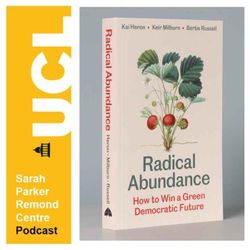
1. SPRC In Conversation with Keir Milburn and Kai Heron: Part 1
22:47||Ep. 1Radical Abundance – understanding the reconfiguration of the global economy and how we might survive itKeir Milburn and Kai Heron in conversation with Gargi Bhattacharyya. This conversation was recorded in the summer of 2025 and discusses the changing role and approach of the United States and the extreme hardships arising from climate catastrophe as triggers to re-imagine the global economy.The conversation was recorded before the publication of Kai and Keir’s excellent and celebrated book, ‘Radical Abundance’, but the themes of the conversation echo the preoccupations of the book.There was a lot to discuss here – as a result we have split the conversation into three sections for ease of listening.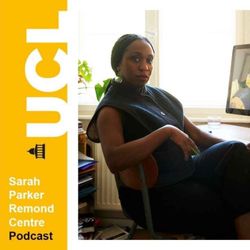
SPRC In Conversation with Edna Bonhomme
34:07|Gala Rexer talks to Edna Bonhomme, culture writer, historian of science, journalist, and author of “A History of the World in Six Plagues: How Contagion, Class, and Captivity Shaped Us, from Cholera to COVID-19” (2025). The conversation covers theoretical and methodological questions about the relationship between confinement and disease, Edna’s anti/inter-disciplinary approach to writing, health and illness in literature, and how the intersectional fight for prison abolition relates to struggles for health equality. This conversation was recorded in June 2025Speakers: Dr Gala Rexer, Leverhulme Fellow at the University of Warwick and Honorary Research Fellow at the SPRC // Dr Edna Bonhomme Producer: Gala Rexer and Trisha HartEditors: James Fox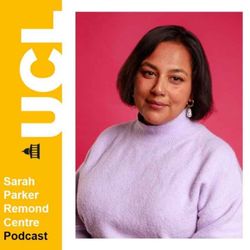
In conversation with Subhadra Das: Ten Lies, Ten Questions
35:23|In this podcast, Subhadra Das answers ten questions on ten lies that make up Western Civilisation. The conversation covers looting, the value of art, the history of statistics, remaking public history, repatriating stolen objects, and what museums and institutions could be doing with their zombies.Subhadra Das is a writer, historian, broadcaster and comedian who looks at the relationship between science and society. She specialises in the history and philosophy of science, particularly the history of scientific racism and eugenics. For nine years she was Curator of the Science Collections at University College London. She has written and presented podcasts and stand-up comedy shows, curated museum exhibitions, and has appeared on radio and TV. She is now working on a book about the golden age of detective fiction and the history of eugenics.Lara Choksey is Lecturer in Colonial and Postcolonial Literatures at UCL English, and Associate Faculty at the UCL Sarah Parker Remond Centre.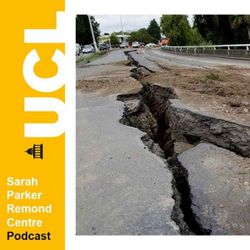
In Conversation: Geopolitics, catastrophe and trying to comprehend the world
27:22|Discussion of Gargi’s research and the new module designed to open conversations about how we might understand the interplay between global politics and the global economy in this moment of rapid realignment.Speakers:Gargi Bhattacharyya, Paige Patchin, Luke de Noronha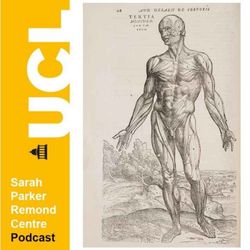
In Conversation: The politics of health in a time of climate crisis
25:41|Discussion of Paige’s research on questions of health, racism and why we must learn to understand the languages of the biological and the pharmaceutical if we are to grasp emerging technologies of racialisation.Speakers:Paige Patchin, Luke de Noronha, Gargi Bhattacharyya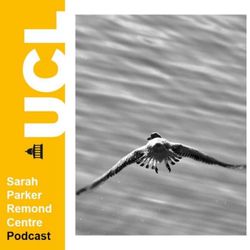
In Conversation: Movement, bodies and the question of race-making
29:38|Discussion of Luke’s research and why thinking about movement and bordering allows us understand emerging machineries of (perhaps) racialised violence.Speakers:Luke de Noronha, Paige Patchin, Gargi Bhattacharyya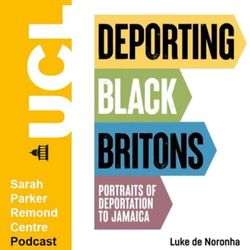
Short Takes: Deporting Black Britons – 5 Years On
12:30|In this Short Takes, Luke reads the preface to the paperback edition of Deporting Black Britons: Portraits of Deportation to Jamaica, published with Manchester University Press in June 2025.